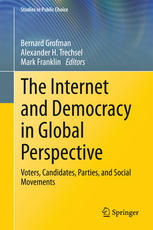

Most ebook files are in PDF format, so you can easily read them using various software such as Foxit Reader or directly on the Google Chrome browser.
Some ebook files are released by publishers in other formats such as .awz, .mobi, .epub, .fb2, etc. You may need to install specific software to read these formats on mobile/PC, such as Calibre.
Please read the tutorial at this link: https://ebookbell.com/faq
We offer FREE conversion to the popular formats you request; however, this may take some time. Therefore, right after payment, please email us, and we will try to provide the service as quickly as possible.
For some exceptional file formats or broken links (if any), please refrain from opening any disputes. Instead, email us first, and we will try to assist within a maximum of 6 hours.
EbookBell Team

4.7
76 reviewsThis volume provides an important update to our current understanding of politics and the internet in a variety of new contexts, both geographically and institutionally. The subject of e-democracy has morphed over the years from speculative and optimistic accounts of a future heightened direct citizen involvement in political decision-making and an increasingly withered state apparatus, to more prosaic investigations of party and governmental website content and micro level analyses of voters’ online activities. Rather than levelling the communications and participation playing field, most studies concluded that existing patterns of bias and power distribution were being repeated online, with the one exception of a genuine change in the potential for protest and e-activism. Across all of these accounts, the question remains whether the internet is a levelling communication tool that elevates the profile of marginalised players in the political system, or whether it is a medium that simply reinforces existing power and participatory biases. While employing case studies from various global perspectives, this book investigates the role of digital media and competitive advantage, campaigns and the effect of social media, online communication as way of fomenting nonviolent revolutions and the undeniable and important role of the internet on democracy around the world.